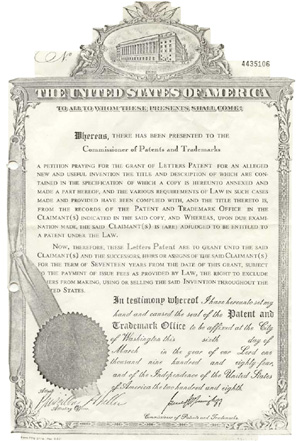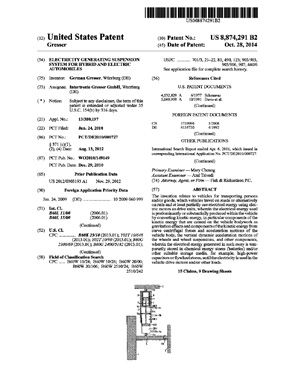The Status Quo and the Future of e-mobility in Germany
Join us in the technological future of electric and hybrid cars.
Become an investor, sponsor or participant in this new technology of the future. Invest in the already-granted US and European patents for the development of the system for series production and manufacture.
Through your involvement, you will receive a lucrative investment in our patents and in future licensing evenues.
Feel free to contact us via email:
Further information, including technical descriptions and an animated video of the functional principle, can be found here.
Germany’s loss of technological Leadership through Management Failure
The man stood at the head of the state and was quite certain: “I believe in the horse. The automobile is a passing fad”. The way that Wilhelm II, King of Prussia and Germany’s last Emperor, galloped ahead of himself over a century ago is oddly fitting for the image that the Germans are currently presenting of themselves.
January 29th was the 125th anniversary of the day that Swabian Carl Benz registered the automobile – a three-wheeled vehicle with a combustion engine and electric ignition - at the patent office of the German Reich. Very few inventions have changed people’s lives as extensively and as lastingly as this one. But in the midst of this celebratory atmosphere some German automotive managers are surrounded by a peculiar aura that is reminiscent of that Wilhelminian horseman. The ‘horse’ that they are so attached to is the combustion engine, with which they have now conquered every corner of the earth. The role of the ‘automobile’, disregarded by Wilhelm II as a passing fashion, now seems to have been taken over by the electric car.
It is in their anniversary year, of all years, that the automobile sector finds itself standing at the crossroads. On one side the assertive parties are pushing as many electrically powered vehicles of all stripes onto the market as quickly as possible using force and violent means. On the other side the sceptics are arming themselves with the aim of extracting the last technical and economic possibilities from the combustion engine for as long as possible.
Germany only in 4th Place
The only thing we can be sure of: the longer the automobile manufacturers hesitate about electrical cars the more they are likely to fall behind their competitors. This is displayed quite potently by the EVI (electric vehicle index) that consultants McKinsey produced for ‘Wirtschaftswoche’ business news magazine and that illustrates for the first time the international race towards an electric vehicle that has taken place over the past 12 months.
...
This latest investigation is less than flattering for Germany as the nation celebrates the anniversary of the automobile, showing as it does that the sector here is hardly progressing when compared with electro-mobility in other countries and that it has even lost ground since the beginning of 2010...
Quote: Wirtschaftswoche Issue 4 / 2011 - Title: ‘Überfälliger Schwenk’ (‘Change of
Direction overdue’)
Our Statement regarding the above article in the ‘Wirtschaftswoche’:
The study ‘Electric Vehicle Index’ (EVI) shows that Germany continues to be ‘in crawling gear’ with regard to electro-mobility with a forecast share of electrical vehicles in the total production in 2015 that puts it in 8th place behind France, Japan, the USA, Spain, Great Britain, South Korea and China. Thus Germany is not at the number one position that the Chancellor desires but rather lagging way behind in the middle range.
Germany’s automobile companies have also long since passed their technology leadership position on to the USA, France and Japan. China is not far behind Germany and is getting ready to overtake. Japan already has an almost unbeatable technological advantage in hybrid technology of more than 10 years. So far, so bad for ermany’s economic perspectives for the future.
There are many reasons for the plight that has now become obvious. One of the main reasons is that the automotive managers were spoiled by decades of international sales successes, became lazy and saw only their daily trade when operating in ‘business as usual’ mode, which is why the Finns lost their earlier technological leadership to the detriment of our economy.
One psychologically understandable cause is that the German automotive managers, as descendents of the ‘car inventors’ Daimler and Benz, want to keep the combustion engine by hook or by crook and therefore only entered into the development of hybrid and electrical cars against their will and much too late when forced to do so by politicians and Asian competitors.
This can be seen quite clearly in the wishful mantra of Wissmann, Zetsche & Co, propagated constantly in public: “Combustion engines will be dominant for a long time to come.” This is just as untrue as the incorrect claims that battery-operated electric cars are ‘too expensive’, ‘too heavy’ and have ‘too little trip range’ etc. In truth these problems no longer exist and have already been resolved from a technical point of view with the new invention ‘electricity from the suspension’, which has been filed as a patent.
Besides the psychological reasons German automotive managers only want to advance these arguments for economic reasons (using the existing systems for the production of combustion engines) to at least delay the rapid spread of electric vehicles and also to divert attention from their own embarrassing failure in losing the prior technological leadership to their east Asian competition.
Dr. Zetsche, head of Daimler Benz, the ‘company that invented the car’, is particularly prominent in continuing to bet technology on the ‘wrong horse’, namely on hydrogen fuel cell vehicles instead of real electric vehicles. This is documented by the current PR project of ‘driving around the world’ in a hydrogen fuel cell vehicle.
This puts Daimler-Head Zetsche on the wrong path technically, economically (investment volume of at least 10 thousand million Euros for hydrogen fuel stations) and in relation to problem of carbon dioxide in the environment because hydrogen is produced from hydrocarbon-charged electricity. This will lead into an uneconomical dead end and could cost Daimler its independence in the near future.
What good is it to Daimler and the German economy if a lot of money is spent building hydrogen fuel stations in some industrial countries, to be financed by the state using tax income (why not by Daimler shareholders?) but it is not possible to sell the corresponding hydrogen fuel cell vehicles in China, India etc. because these countries will certainly not spend that much money on a hydrogen fuel station infrastructure and these countries then build their own electric cars in their place?
The fully electric vehicle is the only future technology that can be sold worldwide because the international patent application ‘electricity from the suspension’ has now solved all the earlier problems and investors in the USA are already interested in it. For technical details on this topic see: www.interpatent.de
This invention gives the German automobile industry the perfect opportunity to achieve a leading international position in the electric vehicle market with a sales-boosting unique selling point if it were to further develop this basic invention for use in serial production.
Unfortunately it is to be feared that Germany’s automotive managers will once again miss this opportunity to the detriment of our economy as at least the German managers all seem to suffer from the ‘not invented here syndrome’, which is difficult to heal, and can only ‘inspire’ one another without taking up ideas ‘from the outside’ in time. Then it will once more be a case of ‘invented in Germany, produced abroad’.
Man is lazy by nature, like all animals. If nothing is bothering him he hardly thinks and acts in a routine way like a machine.
Without creative, independent thinking and judicative embarrassments higher evelopment of society is just as unthinkable as the development of each personality without the breeding ground of the community.
Albert Einstein
(Source; Piper Verlag GmbH München 1997- ‘Einstein sagt’)
Detailed further technical information
Please click here for further technical information about the "Electricity-generating suspension system".
3D-Animation
This video will show you a 3D-animation of the "electricity-generating suspension system" for hybrid and electric vehicles.




